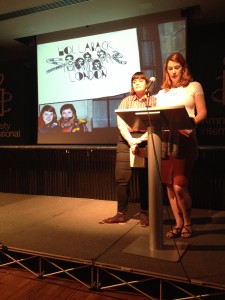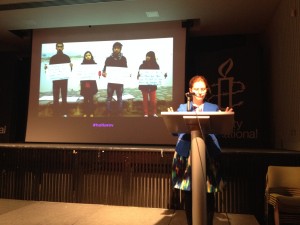Ruth Mair, UK, SSH Blog Correspondent
I attended Holla:Revolution in London a few days ago and it was so inspiring, uplifting, moving, exciting, and many other good words. The main thing I felt attending the event was involved. I felt that I already AM involved, just by being there and aware, interacting with others, hearing their stories, and all the astonishing ways they’ve come up with to combat harassment and address the central problem, but also involved with a more ambitious tint to it.

I felt that I wanted to be up there, on that (pretty small) stage, with all those inspirational humans, saying something relevant, adding my voice, and working on something new to contribute even if I don’t quite know what yet. I wanted the younger me to be there and get inspired by it, and I wanted future me to be there, feeling joy at what has been achieved and the pleasure of knowing that sometimes hard work pays off, even when as Julia Gray from Hollaback! London said, everyone is telling you it won’t work out. Sometimes, human beings are brilliant, and those in the Amnesty International building at this three hour conference were a stellar example of that.
The talks began with an introduction from Emily May, founder of Hollaback!, explaining the history behind the project and what inspired her. Many of us found our own stories being reflected in her account of what inspired (if that is the right word, when we’re talking about the frustration involved in being harassed frequently on the streets) her to begin talking to others about their experiences. We had all had those moments of realisation, the first discussions of what street harassment was, the sharing of stories, just at different times, different places, and with different people, and May’s introduction created an intimate space for all of us to interact, and start creating this revolution that we all want to take place.
Then the first speakers were Bryony Beynon and Gray who co-found Hollaback London in 2010, and since have worked incredibly hard to educate various organisations about the issue of street harassment, including most recently the creation of the Good Night Out campaign and their on-going work with British Transport Police to help make reporting incidents of harassment on public transport significantly easier for all.
Following them was Susuana Antubam, currently NUS National Women’s Officer, discussing harassment on campus, along with various campaigns relating to good consent rules and combating lad culture- both of which, she reminded us, are significant in educating about street harassment and the culture that supports its continued existence.

American Nicola Briggs’ confessions of a subway badass was next. She told her story of confronting the man who had sexually assaulted her on a subway train, as well as the experience of dealing with the aftermath when the videos taken by by-standers went viral.
Samayya Afzal from Bradford University’s students union then discussed the specific experience of street harassment as an identifiable (headscarf-wearing) Muslim woman, particularly the normalisation of this kind of harassment for many of her peers, who had come to simply expect such treatment when stepping outside of their own houses. She also touched on the issue of online harassment, and how much weight that can place on the shoulders of activists (and others) who have to cope with multifaceted harassment.
The last speaker before the 10 minute break was a representative from the Sex Workers Open University, along with a proviso that we must not tweet or photograph this speaker. Through the process of relating stories of harassment, the speaker emphasised the importance of addressing why people feel offended if they are called a whore, or identified as one mistakenly, as well as talking about the difference between clients and harassers, and finishing with an emphasis that sex workers need to be included in discussions of harassment, and that we need to end exclusion of sex workers by feminist groups.
The repetition of these stories of harassment may well make the event look like a great big group therapy session, but hopefully that’s only to the cynical reader. It is incredibly important still that these stories are repeated, shared, and added to even if we keep hearing the same thing. Because it’s only through taking part in that kind of cathartic exercise that we will be able to educate others, allow ourselves to recover from what we have experienced, and most importantly, remind ourselves whenever we’re starting to feel weak or tired out by it all, that such harassment is NOT OK, in those big intentional capital letters. We have the support of so many others who have experienced the same, and are sympathetic to the exhaustion that comes with the armours that we clothe ourselves in to cope.
After the break there was an immensely moving performance by (50% of) Sauna Youth, of their piece that will eventually be worked in to a bigger piece called “A Thousand Tiny Pinpricks,” but at present is on their album Distractions as (Trying to take a) Walk. It has stories of harassment in the form of spoken word repeated and layered over music, with both the views of the harassed, and those of bystanders and allies expressed.
Then Laura Bates from Everyday Sexism Project spoke about education and solidarity, the importance of standing alongside one another in order to stand against sexism and sexualised harassment, and reminding us all of the hypocrisy that sometimes occurs, where women are treated equally in some situations but as second class citizens in others.
Bisi Alimi, an LGBTI campaigner, and the first gay person to come out on national television in Nigeria, spoke next about the differences between homophobia and the street harassment experienced by LGBTI people. He touched on the occurrence of corrective rape and aggression faced by trans people, and those with non-binary appearances. Alimi was full of energy, and the talk, although only 10 minutes, was packed full of information, much of which I had not encountered previously even though I am relatively engaged with discourses and media concerning street harassment and campaign work.
Sabria Thompson from Hollaback! Bahamas showed a video explaining the projects they are undertaking, including asking average professional women to wear cameras for several days to record the harassment that they receive, in order to make others understand how frequently the average women receives such harassment and how pervasive it can be.
The final speaker was Vanessa Smith-Torres from Hollaback NOLA, who spoke about how her experience as an architect had influenced her approach to street harassment and the ways in which public spaces need to be changed to make them fully accessible to women. She gave us a preview of the designs for a large scale art project to be created in New Orleans in order to draw attention to the experiences of women and their interactions with being outside and using public spaces.
To finish the event, there was a group panel of all the speakers, taking questions from the audience and discussing various points such as the future of anti-street-harassment work, and finishing with each speaker relating to us the two main things they thought were most important when it comes to combating street harassment.
The one that stuck with me, and has been chiming in my head, every time I go out my front door, has been Briggs’; “Use your voice!”. I think this struck a chord with me, because personally I have always been of a quiet inclination, more likely to ignore someone pressing up against me on the Tube, or simply scowl and say nothing if someone catcalls me.
It served as a reminder also, that we are at our most powerful as a movement when we use our voices in all the ways we can- by communicating the issue, bringing it out in to the open, and making sure that no one can look away or sweep it, or us, under the carpet, or into the quiet corners of nightclubs, or the badly lit streets that we walk down at night, again. That is how we will make this revolution happen.
Ruth is a human rights MA student finishing her MA dissertation on the legal and normative rights of terror suspects in the UK (spoiler alert: rights are being violated). She also plays bass in a band called Kinshot, sews as often as she can, and spends time getting annoyed at the cat sleeping on top of her computer.

